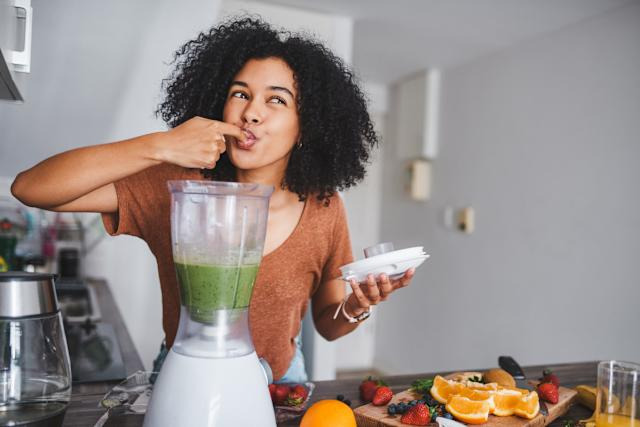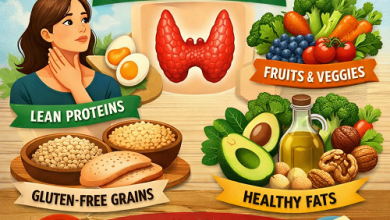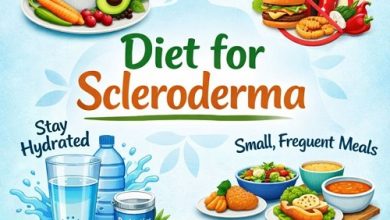7 Sneaky Signs You’re Not Eating Enough Protein—Dietitians Reveal the Truth

Protein isn’t just for bodybuilders, athletes, or people trying to “bulk up.” It’s an essential macronutrient that every single cell in your body needs to function. From muscles growth and improve your immune system to producing enzymes and hormones, protein plays a critical role in keeping you alive and well.
Yet despite its importance, many people aren’t getting enough protein—sometimes without even realizing it. While the recommended dietary allowance (RDA) for protein is about 0.8 grams per kilogram of body weight per day, dietitians argue that this number is actually the minimum required to prevent deficiency, not necessarily what’s optimal for thriving health.
So how can you tell if you’re falling short? The signs aren’t always obvious. Fatigue, mood changes, brittle hair, and even constant cravings can all point toward protein insufficiency. To help you decode what your body might be telling you, we asked registered dietitians to reveal the 7 sneaky signs you’re not eating enough protein—and how to fix it.
What is Protein?
Protein is one of the most essential nutrients for life, often referred to as the “building block” of the body. From maintaining muscle to supporting enzymes, hormones, and even your immune system, protein plays countless roles that keep you healthy and strong. Yet, despite its importance, many people only have a vague idea of what protein truly is and why it matters so much.
This article will explore the science of protein, its functions, sources, daily requirements, and its impact on human health. By the end, you’ll have a deep understanding of why protein is indispensable to life.
The Structure of Protein
Proteins are not all the same—they differ greatly in size, shape, and function. The structure of a protein can be understood at four different levels:
Primary structure: The specific sequence of amino acids in the chain. Even a single change can alter the function dramatically. For example, sickle cell anemia is caused by one amino acid substitution in hemoglobin.
Secondary structure: Local folding of the chain into patterns such as alpha-helices or beta-sheets.
Tertiary structure: The overall three-dimensional shape of a single protein chain, determined by how secondary structures fold and interact.
Quaternary structure: When two or more protein chains combine to form a functional protein complex (e.g., hemoglobin).
This structural complexity is what allows proteins to carry out such a wide variety of tasks inside the body.
The Functions of Protein in the Human Body
Protein is often associated with muscle growth, but its responsibilities go far beyond that. Some of the main functions of proteins include:
1. Structural Support
Proteins form the framework of your body. Collagen, for example, is the most abundant protein in the human body and provides strength and elasticity to skin, tendons, bones, and cartilage. Keratin is another structural protein that makes up hair, nails, and the outer layer of skin.
2. Enzymes
Enzymes are proteins that act as catalysts, speeding up chemical reactions in the body. Without enzymes, most biological processes would occur too slowly to sustain life. For example, digestive enzymes like amylase, lipase, and protease help break down food into nutrients.
3. Hormones
Some hormones are proteins that regulate processes in the body. Insulin, for example, is a protein hormone that controls blood sugar levels. Growth hormone stimulates development, while glucagon helps maintain glucose balance.
4. Transport and Storage
Proteins also move substances around the body. Hemoglobin is a transport protein in red blood cells that carries oxygen from the lungs to tissues. Ferritin stores iron in cells, while lipoproteins transport fats through the bloodstream.
5. Immune Function
Antibodies (immunoglobulins) are proteins that help defend the body against bacteria, viruses, and other pathogens. Without protein, the immune system cannot function properly.
6. Fluid Balance
Proteins in the blood, such as albumin, help maintain the balance of fluids between blood vessels and tissues. A lack of protein can lead to swelling (edema) because fluid leaks into tissues.
7. Energy Source
Although carbohydrates and fats are the body’s preferred sources of energy, protein can also be used when needed. Each gram of protein provides about 4 calories. However, using protein for energy is not ideal since it takes away from its more important structural and functional roles.
7 Sneaky Signs You’re Not Eating Enough Protein
If you’ve been feeling off lately, here are 7 surprising signs you might not be eating enough protein—and what you can do about it.
1. You’re Constantly Hungry—Even After Eating
Do you find yourself rummaging through the kitchen an hour after a meal, even if you ate a decent portion? That nagging hunger could be linked to insufficient protein.
Protein is the most satiating macronutrient—meaning it keeps you full for longer. Unlike simple carbs that cause quick spikes and crashes in blood sugar, protein helps slow digestion and stabilizes energy. Without enough of it, your meals may leave you unsatisfied, leading to overeating or constant snacking.
👉 Dietitian’s Insight:
“Many people focus heavily on carbs at breakfast—think cereal, toast, or pastries,” explains registered dietitian Dr. Michelle Routhenstein, RD. “But without protein, these meals won’t sustain you. Adding eggs, Greek yogurt, or a protein smoothie can make all the difference.”
What to do: Aim for 20–30 grams of protein per meal, especially at breakfast, to set the tone for your day.
2. You’re Losing Muscle Mass (Even If You’re Not Trying To)
Muscles aren’t built from thin air—they require protein to grow and maintain themselves. If your intake is too low, your body may break down muscle tissue to access the amino acids it needs for basic functions, like producing enzymes or repairing cells.
This is especially concerning as you age. Adults naturally lose muscle mass over time, a condition known as sarcopenia, which can lead to weakness, falls, and slower metabolism.
👉 Dietitian’s Insight:
“If you notice that your body feels weaker, or you’re not as strong at the gym despite exercising regularly, protein deficiency could be playing a role,” says Lauren Harris-Pincus, MS, RDN.
What to do: Pair protein-rich foods with strength training to help preserve lean muscle. Sources like chicken, fish, tofu, lentils, and protein powders are all excellent choices.
3. Your Hair, Skin, and Nails Look Weak or Brittle
Protein isn’t just about muscles—it’s also the foundation of keratin, collagen, and elastin, which make up your hair, skin, and nails. Without enough protein, your body prioritizes critical functions over cosmetic ones, which means beauty often takes the hit first.
Signs can include:
- Hair thinning or falling out
- Weak, brittle nails that break easily
- Dull or sagging skin
👉 Dietitian’s Insight:
“When protein intake is chronically low, the body essentially redirects its resources,” explains Keri Gans, RDN. “That’s why you may see outward changes in hair and skin health—it’s your body telling you something’s missing.”
What to do: Incorporate a variety of protein sources—both animal and plant-based. Don’t forget collagen-boosting foods like bone broth, beans, and citrus fruits (rich in vitamin C, which aids collagen synthesis).
4. You’re Constantly Tired or Weak
Fatigue is one of the most overlooked signs of inadequate protein. Proteins help transport oxygen throughout the body, support energy metabolism, and regulate blood sugar levels. Without enough, you may feel sluggish even if you’re sleeping well.
Additionally, protein deficiency can impair the production of hemoglobin, potentially leading to anemia-like symptoms such as weakness, dizziness, and lack of focus.
👉 Dietitian’s Insight:
“If you’re always tired despite good sleep, take a closer look at your diet. It’s not always about iron or vitamin deficiencies—sometimes, you’re just not eating enough protein to sustain energy,” says Tamara Duker Freuman, MS, RD.
What to do: Instead of relying solely on carbs for quick energy, balance your meals with lean protein and healthy fats for sustained fuel.
5. You’re Getting Sick More Often
Protein plays a crucial role in immunity. Antibodies, immune cells, and signaling molecules are all made from amino acids. When your diet is low in protein, your immune defenses may weaken, leaving you more vulnerable to frequent colds, infections, or slow wound healing.
👉 Dietitian’s Insight:
“Protein is like the construction material for your immune system,” says Susan Bowerman, MS, RD. “If you don’t provide enough, your body can’t build the army it needs to fight off illness.”
What to do: Add immune-supporting protein sources like lean meats, eggs, dairy, beans, and nuts. If you’re plant-based, focus on combining legumes with grains to ensure a complete amino acid profile.
6. You’re Struggling With Mood Swings or Brain Fog
Your brain needs protein, too. Amino acids are the building blocks of neurotransmitters—chemicals like serotonin, dopamine, and norepinephrine that regulate mood, motivation, and focus. Without enough protein, your mental health can take a hit.
Common symptoms include:
- Feeling irritable or anxious
- Difficulty concentrating
- Brain fog or forgetfulness
👉 Dietitian’s Insight:
“Protein directly impacts brain chemistry,” explains Maggie Michalczyk, RDN. “Low intake can affect neurotransmitter balance, which may contribute to mood swings and poor focus.”
What to do: Incorporate protein evenly throughout the day rather than saving it all for dinner. This steady supply helps regulate blood sugar and supports mental health.
7. You’re Experiencing Slow Recovery After Workouts or Injuries
If you’re sore for days after exercise or notice that cuts and bruises take longer than usual to heal, low protein intake could be the culprit. Protein is essential for muscle repair and tissue regeneration. Without it, your body struggles to bounce back.
👉 Dietitian’s Insight:
“When recovery feels unusually slow, that’s a red flag,” says Jessica Cording, MS, RD, CDN. “Athletes and active individuals need even more protein than the average sedentary person to support repair and growth.”
What to do: Active adults may need 1.2–2.0 grams of protein per kilogram of body weight daily to optimize recovery. A post-workout snack containing 20–30 grams of protein is a smart way to refuel.
How Much Protein Do You Really Need?
The general guideline of 0.8 grams per kilogram of body weight is just the bare minimum. For example, a 150-pound (68-kg) person would only need about 55 grams of protein per day by RDA standards—but most dietitians recommend aiming higher, especially for:
- Active individuals: 1.2–2.0 g/kg/day
- Older adults: 1.0–1.5 g/kg/day to prevent muscle loss
- Weight loss goals: Higher protein helps preserve lean muscle during calorie restriction
👉 Rule of Thumb: Try to spread your protein intake evenly throughout the day—about 20–30 grams per meal.
Best Protein Sources to Add to Your Diet
Animal-Based Proteins
- Chicken, turkey, lean beef
- Fish (salmon, tuna, cod)
- Eggs and egg whites
- Dairy (Greek yogurt, cottage cheese, milk)
Plant-Based Proteins
- Lentils, chickpeas, black beans
- Quinoa, farro, buckwheat
- Tofu, tempeh, edamame
- Nuts, seeds, and nut butters
- Plant-based protein powders
Final Thoughts
Protein is far more than a muscle-builder—it’s a vital nutrient that keeps your entire body functioning at its best. The signs of low protein aren’t always obvious at first. Constant hunger, fatigue, hair and skin changes, and weakened immunity can all creep in slowly, making it easy to overlook the real issue.
The good news? Addressing protein intake can bring noticeable improvements within weeks. Whether you eat meat or follow a plant-based lifestyle, there are plenty of options to ensure you’re fueling your body with what it needs.
Q1: Can you eat too much protein?
Yes, excessive protein (especially from supplements) may strain the kidneys in people with pre-existing kidney conditions. However, for healthy individuals, higher protein diets are generally safe.
Q2: Is plant-based protein as good as animal protein?
Yes, but plant sources may lack certain essential amino acids. Combining foods (like beans and rice) ensures you get a complete protein profile.
Q3: How can I increase protein without eating meat?
Incorporate foods like tofu, tempeh, lentils, beans, quinoa, chia seeds, hemp seeds, and soy milk. Plant-based protein powders can also help.
Q4: Does timing matter for protein intake?
Yes. Spreading protein evenly throughout meals improves muscle synthesis and satiety compared to eating it all at once.
Q5: What’s the best protein choice for weight loss?
Lean protein sources like chicken breast, fish, Greek yogurt, eggs, and plant-based proteins paired with vegetables and healthy fats support weight loss while preserving muscle.




